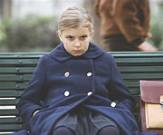|
|
||||
|
|
by Donald Levit  Add Julie Gavras’ Blame It on Fidel/La Faute à Fidel to recent features directed by revered directors’ daughters, only give higher marks than most for adventurousness. Written for the screen by Gavras and three “script collaborators” from the novel Tutta Colpa di Fidel, the film lacks a sympathetic character even in eternally petulant child protagonist Anna de la Mesa (Nina Kervel, in her début) and is lax in differentiating who’s who. Although the stamp is clear of an offspring of Constantin Costa-Gavras in politics, sociopolitical happenings are in the end only the springboard for a cinematographically rare point of view, that of a nine-year-old. Use of a young person who observes an adult world and, with unadorned expression, unknowingly exposes its hypocrisy to mature readers who understand more, is old in literature, from Lazarillo to Huck and Holden, even Junie B. The departure in this film is that Anna is shown overhearing snatches of conversations, having issues explained in what adults think are child’s terms, listening to the teaching nuns at Catholic school, swapping kids’ whispered misconceptions about procreation and its organs, and dragged to a street demonstration that turns tear-gas ugly. That this is her incomplete perspective is reinforced from the very opening by shots taken at her level and surrounded by legs and torsos of grown ups, cut off out-of-frame above. Anna is a conventional middle-class girl, studious, self-centered and careful not to depart from routine nor get a wedding veil dirty. Her dismay is logical when all comes crashing down, with unconvincing ease, in the once-secure atmosphere they say children need. A problem for the story, purposely unresolved but still bothersome, is that one never knows what is passing in Anna’s consciousness, except anger. Retreating into stubbornness, alternating silence with yelling tantrums, insisting on leaving for the security and continuity of her Gaullist maternal grandparents’ (Oliver Perrier, Martine Chevallier) stately Bordeaux home, she resists change but can never show what she may, or may not, have learned, what she does or does not think. Some viewers already know what they have learned and lived about the Spanish Civil War and its aftermath of guilt, about the civil and university unrest of May 1968 or hopes for Chile’s Socialist mandate and the La Moneda 9/11 that ended all that. Many others will not, and while it is not this film’s mission to supply that missing history, they will get only the vaguest of background, no more than the brother and sister who “play Franco and Allende.” Long absent from his family’s Toledo estates, successful lawyer Fernando (Stefano Accorsi) has never returned to Franco’s Spain and is married to Marie Claire writer Marie (Gérard Depardieu’s daughter Julie) and the father of Anna and blonde, younger François (Benjamin Feuillet). Their comfortable world is upset by the arrival of his disillusioned sister Marga (Mar Sodupe) and niece Pilar (Raphaelle Molinier), smuggled across the Pyrenees after fifteen years fighting the fascist Falange and the killing of her husband Quino. Too quickly for credibility, Fernando and Marie throw over their lifestyle, incomes and suits and, leaving the two children in the first of ever more humble apartments, in the care of the first of ever-changing political-refugee nannies, head off for the excitement that was 1971 Santiago de Chile. Mother returns with a mission to change France’s 1920 law to “Free Abortion and Contraception,” and Daddy a commitment to world leftist causes and sporting a new beard like the barbudos, “bearded ones,” Communists and “beatnik hippies” who crowd the de la Mesa place, smoke, drink, talk, sing “Venceremos” and unsuccessfully lay out redistribution of wealth to sullen Anna, who “wouldn’t buy it.” Fernando is left to be cute and mischievous, but the film allows Anna to hear snips she cannot comprehend, to witness blistering parental arguments, and to be shut off at parochial school as, for example, she is the one student taken out of catechism class. Despite occasional family tenderness, Anna would seem a candidate for later psychoses, the fruit of selfish or misguided parents who force her into militant pro-abortion centers, frightening street marches, rooms filled with smoky political rhetoric. Perhaps the point made here is that this child’s world changes, earlier than usual and bewilderingly from her limited point of view and realization. If so, that unintended cruelty is not rounded enough for a feature film. As we welcome final moments showing Anna with a yellow school satchel and the promise of new ring-around-a-rosy friends, we can’t help hoping her stability will not be dashed yet again. (Released by Gaumont/Columbia TriStar Films; not rated by MPAA.) |
||
|
© 2024 - ReelTalk Movie Reviews Website designed by Dot Pitch Studios, LLC |



